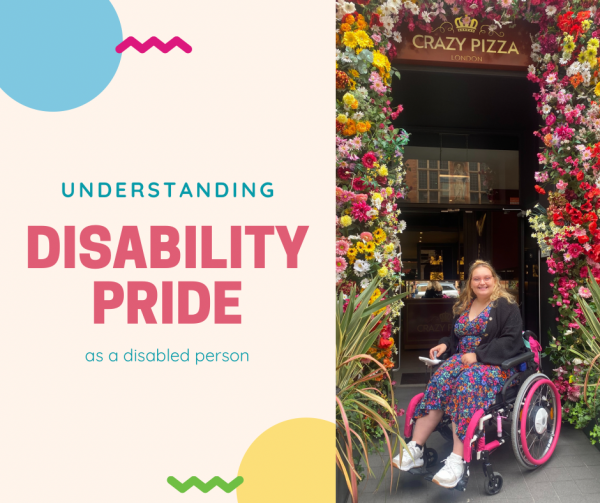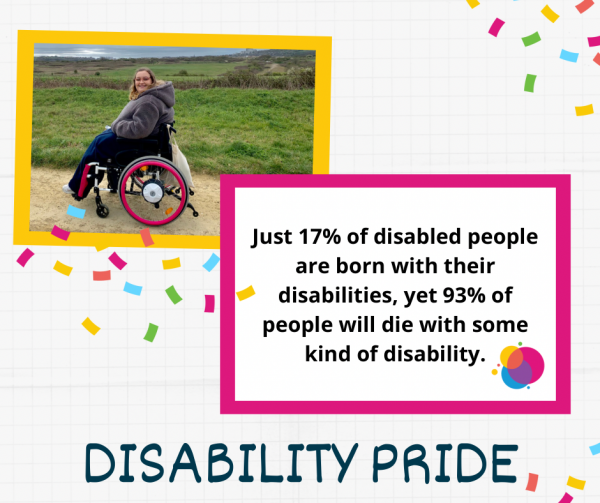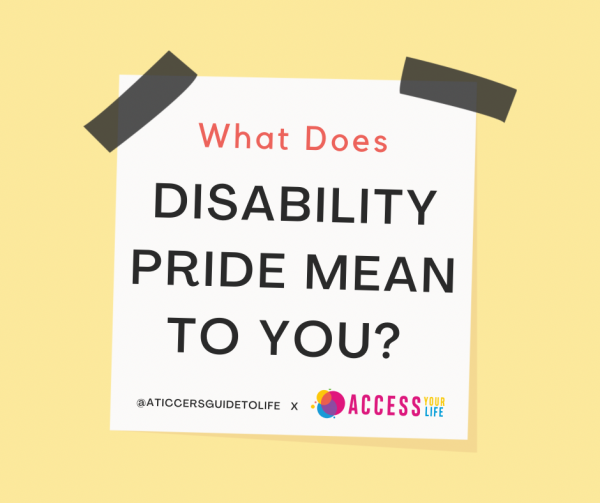
* This post has been written by one of our volunteer content creators. *
As we reach the end of Disability Pride Month, I was honoured to have been asked by Lauren to reflect on my thoughts regarding this occasion as a disabled person. Disability Pride can often be a really challenging month for people with disabilities, as there is very little awareness. It certainly can spark many thoughts and feelings for me. This is because people with disabilities deserve equal opportunities, reasonable adjustments, love, awareness, safe living, and good healthcare. Access to all shops, restaurants, and leisure activities. But most importantly, support from the government, all in the same way their non-disabled peers do.

I first came across the term ‘Disability Pride’ in a passing conversation when I moved to Brighton. Despite being a disabled heterosexual female myself, I automatically assumed Disability pride represented LGBTQ+ disabled people. Interestingly after speaking to many others, they assumed it meant the same thing. Yet Disability Pride Month was started with the aim of raising awareness of all disabilities, encouraging self-love, and breaking stigmas.
The word pride to me represents strength. I often talk about using your negative experiences to make them a positive. People are so quick to ‘feel sorry for disabled people’, when in fact people with disabilities are people who have been given a different opportunity in life. We are resilient. We are strong. We are brave. We are powerful. We are empathetic. All despite our disabilities. So, whether being proud of your disability means talking about your struggles, understanding your limits, or accepting a newfound diagnosis, just remember that it can take some time to acquire such mindsets. But you will get there! It certainly took me while to do so, but now I take great pride in my disabilities and the strength required to overcome the endless associated challenges and setbacks.
Disability Pride can be a really difficult month for many people living with disabilities, particularly those who struggle to accept their disability. But this is something most of us experience at some point, so just remember that you are not alone. The moment things started getting better for me was the moment I accepted ‘this is it’.
It’s okay to mourn the loss of your teen years or grieve the life that could’ve been. I often feel jealous when we see my peers doing things, I could only dream of doing without the consequences of ill health. But then I remember the things I can do, and the things I have experienced because of my disabilities, and it helps.

Disability Pride for me is about remembering that it’s also okay to feel negative, angry, or resentful about your disabilities sometimes. I frequently feel frustrated about the way we are treated as members of society. I feel anger at the casual ableism, annoyance at the inaccessibility of the world around us, and embarrassment at the fact I still feel like I need to hide away.
Disability Pride for me is a time for us to celebrate the people our disabilities have made us, whilst remembering all the amazing qualities we have as people regardless of our disabilities. Whether it be a friend, a daughter, a dad, a teacher, a good cook, a shoulder to cry on etc.
Disability Pride for me is a time to smile, as we look back on all the rubbish we overcome to get to where we are today. It isn’t fair, but it is also amazing to see the progress we have made towards creating a more inclusive world. The small steps *pardon the pun* when a shop has a permanent ramp fitted, or hires a disabled model is always a head in the right direction.
To conclude, people with disabilities need to be normalised within society. We are not scary, we are powerful, we are loved, and we are worthy. I love the community our disabilities have helped us build.
EDUCATE, ADVOCATE & EMPOWER.
Love you for who you are, you only get one ‘you’. Remember this can be difficult, so don’t rush, I’m still learning too!
Lauren x

Hi, I'm Lauren and I have been living with a collection of disabilities for the past 8 years. I initially had a passion for teaching children with special needs, but my health prevented me from pursuring my dream career. Despite this, I now love nothing more than sharing my experiences to help other people living with disabilities.
Hi, I’m Lori and was diagnosed with Ehlers Danlos Syndrome and a family of co-morbid conditions which has made life highly complex. However I constantly aim to make life as ‘normal’ and fulfilling as possible - and through this, I discovered the benefits of writing about my journey.
 GET IN TOUCH
GET IN TOUCH


